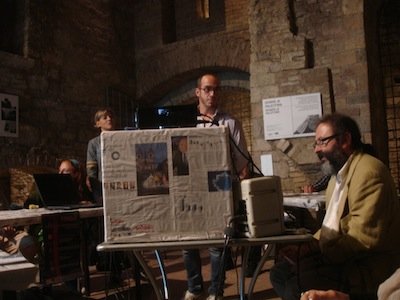Story and photos by Anthony Savvides
Over the weekend, Perugia hosted the annual “SottoSuolo” (Underground) Fesitval in Rocca Paolina, an ancient part of Perugia that is now underground and serves as a first impression of the city for many visitors. Though the festival ran from Friday, October 5 through Sunday, October 7, there was a preview festival on Thursday organized by FIDEM (Festival delle Idee Euro-Mediterranee) thanks to its partners Silvio Nocera and Manuela Vena; during “New Media ai Confini della Verita” (New media on the edge of the truth), a daylong seminar, journalism and communications students participated in a discussion of new media, social media, and how the landscape of journalism is changing.
In the morning, a group of professional journalists, each representing a different media or news outlet, took center stage and spoke to those in attendance. The speakers present in Rocca Paolina included: Sara Cipriani of TuttOggi.info; Andrea Billau of RadioRadicale.it; and Flavia Baldassarri, professor of communications science at the University of Perugia (Università degli Studi di Perugia). Many of the topics discussed revolved around the new media and the Internet, and how both are changing the way people receive their news.
A few journalists took time out of their day and Skyped in to join the panel: Chiara Cruciati, a freelance journalist who works for NENA (Near East News Agency), and Salam Khoder, a correspondent for Sky News Arabia. Both of these young women are fluent and Arabic and English, and as a native of Umbria, Cruciati also speaks Italian. Cruciati focused on the importance of social networking as a way to release information to the masses, and as a way of uniting people behind one cause. Khoder echoed her ideas, detailing the impact social media has had on the Arabic Spring revolutions and within war zones.
“This was not a sudden change,” said Khoder, referring to the revolutions that began in Tunisia in December 2010. “Young Arabic bloggers were very active before Tunisia’s revolution, but Arab regimes didn’t pay enough attention to young Arabs using new media.”
Khoder told the group stories about young revolutionaries who had been unfairly detained, falsely accused, beaten, and in some cases, even killed. Her vivid details were meant to strike some fear into the minds and hearts of the young, aspiring reporters with whom she was speaking.
“Arab revolutions are not only happening on facebook, twitter, and blogs, but they’re happening on the streets now,” Khoder continued.
Her message was clear: social media and the Internet have allowed for information to spread like never before. Similarly, though, modern technology has also tarnished the art and accuracy of journalism. In some cases, information that is not entirely correct may be altered so that it appears true, and might then be wrongly reported.
Sometimes, activists will upload material to the Internet out of sheer frustration, because there is no access to the official, more traditional media outlets. Such was the case when a video appeared on You Tube showing Libyan officials dumping a container, supposedly filled with bodies, into the Mediterranean Sea. How can a journalist take this information and verify it before reporting it, Khoder asked the students.
In the face of an ever-evolving news media, Khoder declared that it is crucial for modern journalists to have knowledge of the political and geopolitical situation and history of a region in order to work there. Such information will assist with fact checking and verification, she asserted.
Another Skype call came from Brussels, Belgium, where Anis Bedda was located. A young reporter from Tunis, Tunisia, Anis works as an active blogger and has been based in Canada, Turkey and Spain.
After a lunch break, the group reconvened in Rocca Paolina to create a mock, false news story while working with the professionals around them. The story was meant to immerse them in the world of journalism and simulate a real-world work environment where they may soon find themselves. This particular exercise, however, was meant to expose how incorrect information can be reported and spread without anyone questioning its validity and truth.
During the course of the afternoon, the students worked together to craft a news story and video package about financial assistance being offered to immigrant students within Italy. The story detailed Perugian students protesting the proposed plan and calling for more assistance for Italian students.
Though the news story and video are based on false, incorrect information, the story was spread via various social media outlets and received comments from the public, debating about a topic that doesn’t exist. With no one questioning the news or the information, it became clear to everyone involved in the workshop how journalists and news media outlets can so easily steer the public in the wrong direction.
A journalist and news organization should be responsible for providing the public with the information, from an objective perspective, thus allowing the public to discuss and debate the information. In today’s industry, however, that objective can become blurred by the race and desire to “get it first.”
As Khoder said before ending the Skype call: “It is better to be right than to be first.”
Articolo Correlato: Questa notizia è vera? Il fake, i social media e il ciclo virtuoso dell'informazione
Video: the false interviews





